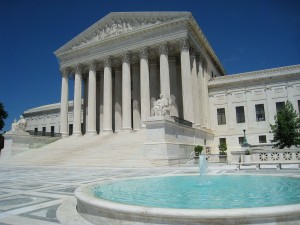Ideal Federal Appeal Lawyers: Getting Justice in Federal Appeals
Ideal Federal Appeal Lawyers: Getting Justice in Federal Appeals
Blog Article
Debunking the Process of Federal Appeals: What You Need to Know
Navigating the complex world of government allures can usually appear like traversing uncharted waters for those unknown with the procedure. Recognizing the subtleties of appellate court territory, the intricacies of filing a notice of appeal, presenting a compelling quick, and making a persuasive oral argument are vital components that can considerably affect the result of a situation. By deciphering the layers of complexity surrounding federal appeals, people can obtain a clearer understanding right into the devices that control this critical point of the lawful system.
Comprehending Federal Appeals Process
Exploring the intricate world of the government charms process unveils a structured and systematic journey through the judicial system. Federal allures work as a vital system for evaluating decisions made by lower courts. Understanding this process is essential for any person entailed in legal proceedings at the government level.
The process typically starts with a celebration dissatisfied with a reduced court's judgment filing a notice of allure. This activates a review by a greater court, where a panel of courts assesses the lawful disagreements presented by both events. Briefs describing the legal reasoning behind each party's placement are submitted, and dental disagreements might be heard to clear up complex concerns.
The appellate court's decision is based on a thorough examination of the reduced court's process and the disagreements provided. Once the appellate court reaches a choice, it can attest, turn around, remand, or customize the lower court's judgment, offering quality and finality to the legal disagreement.
Appellate Court Territory Explained
Appellate court territory refers to the scope of instances that a specific appellate court has the power to evaluate and decide upon. Unlike trial courts that hear situations for the initial time, appellate courts are limited to examining decisions made by reduced courts.
Appellate courts have jurisdiction over details sorts of situations, usually those including legal mistakes, step-by-step issues, or inquiries of law rather than accurate disagreements. The jurisdiction of appellate courts is normally outlined in laws and regulations that govern the court system. Recognizing appellate court territory is important for events associated with the charms procedure as it establishes whether a case is eligible for evaluation and the level to which the appellate court can interfere in the reduced court's decision.
Filing a Notification of Allure
The initial action in beginning the government allures procedure entails filing a Notice of Appeal with the proper appellate court. This vital document formally notifies the court and the other celebrations included in the situation that the appealing celebration plans to look for a testimonial of the reduced court's choice. Submitting a Notification of Allure is a rigorous step-by-step need that establishes the appellate procedure in motion.
When preparing the Notice of Appeal, it is necessary to guarantee compliance with the particular guidelines and guidelines of the relevant appellate court. federal crime lawyer. The paper should usually include info such as the case name, the lower court's name, the day of the judgment being appealed, and a succinct declaration suggesting the grounds for official site the appeal

Briefing and Dental Argument
In the appellate process, offering created briefs and engaging in oral disagreements play critical roles in advocating for the appealing celebration's placement before the appellate court. Briefs are thorough legal papers that lay out the celebrations' debates, lawful authorities, and analysis sustaining their positions. These created entries give the court with an in-depth understanding of the truths of the situation, the relevant regulation, and why the appealing party believes the reduced court's choice ought to be overturned.
Following the entry and testimonial of the briefs, oral disagreements use the events a possibility to further clarify their settings, address any type of inquiries the appellate courts might have, and emphasize key factors from their created briefs. Oral disagreements are a chance for the attorneys to encourage the judges via verbal advocacy and actions to queries from the bench.
Both the written briefs and oral disagreements are critical components of the appellate process, enabling parties to present their situation completely and compellingly before the appellate court. - federal crime attorney
Obtaining the Appellate Court Choice
Upon completion of dental disagreements and entry of written briefs, the following critical stage in the appellate process includes awaiting the definitive judgment from the appellate court. This duration of expectancy can be full of a mix of anxiety and hope for events associated with the allure. The appellate court's decision is generally supplied in a written layout and outlines the court's verdicts on the legal concerns presented, the thinking behind their decision, and the judgment provided. The moment framework for receiving the appellate court's choice can vary, yet courts aim to supply timely resolutions. As soon as the choice is issued, events must meticulously examine the court's ruling to understand the end result and figure out any kind of further actions that might be necessary. Whether the appellate court attests, turns around, or remands the lower court's decision, recognizing the ramifications of the judgment is vital for all celebrations associated with the appellate procedure. For that reason, promptly examining and comprehending the appellate court's choice is essential in navigating the next actions in the legal process.
Verdict
Comprehending the appellate court jurisdiction, filing a notice of appeal, preparing briefs, and presenting dental debates are all vital components of this procedure. Inevitably, obtaining the appellate court choice can give quality and resolution to lawful disagreements.
As we advance from comprehending the federal charms process to dissecting the intricacies of appellate court jurisdiction, an essential element comes to light concerning the authority and restrictions of these higher courts in the legal landscape. Appellate court territory refers to the scope of situations that a certain appellate court has the power to examine and decide upon. Unlike test courts that hear instances for the very first time, appellate courts are restricted to reviewing choices made by lower courts. Recognizing appellate court territory is crucial for parties involved in the appeals process as it identifies whether a situation is qualified for testimonial and the degree to which the appellate court can intervene in the reduced court's choice.

Report this page